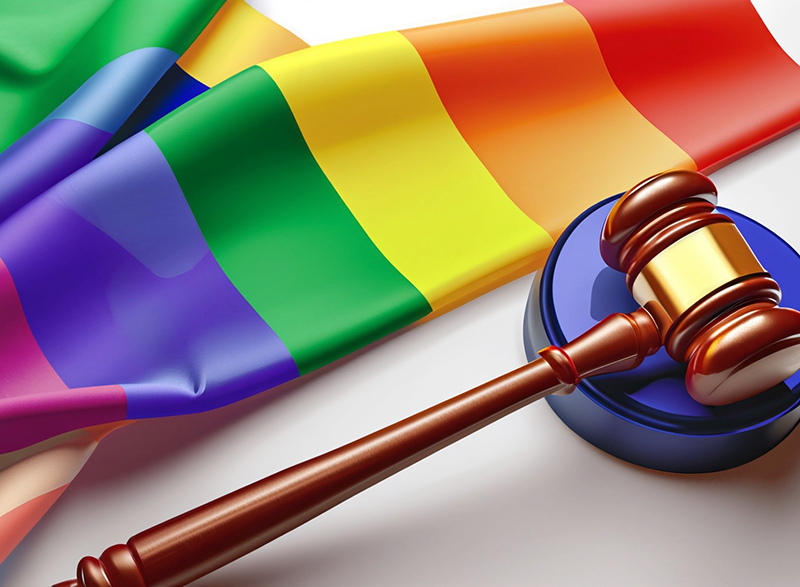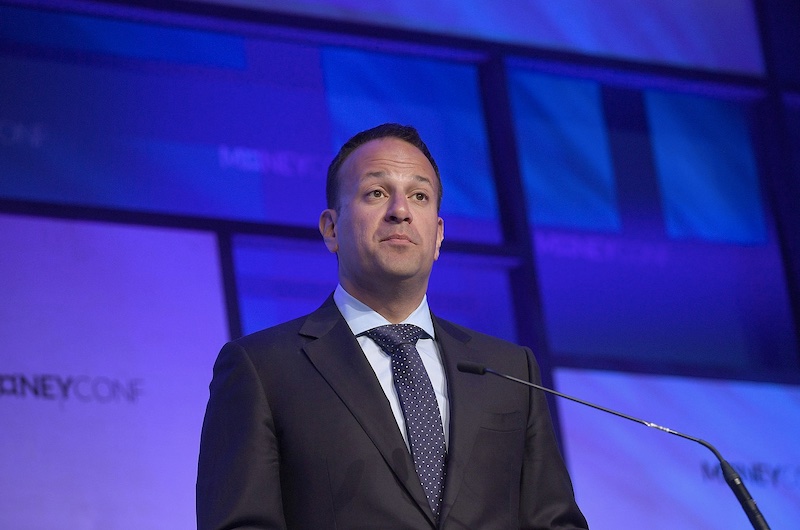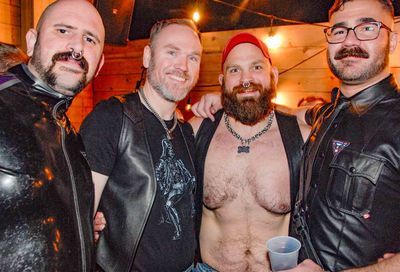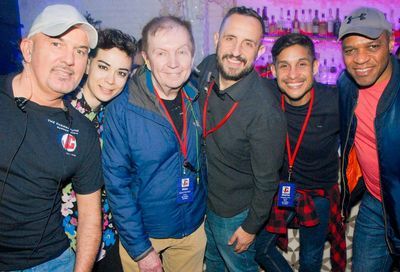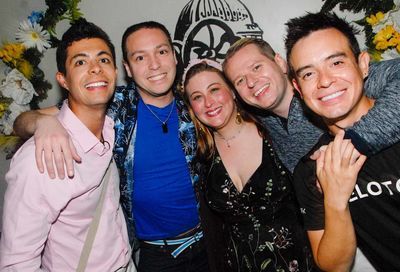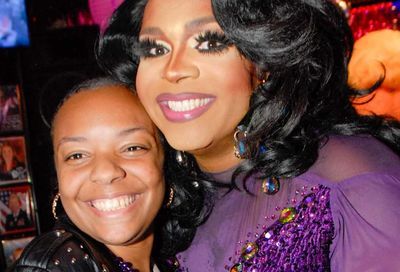One Year Later
Roberta Kaplan, the lawyer who represented Edith Windsor in her legal fight against DOMA, looks back at the beginning of the end
By Justin Snow on June 25, 2014 @JustinCSnow

Photo by Kate Barrett Gallery
MW: This was the first case you argued before the Supreme Court.
KAPLAN: Yeah. That just had a little impact on increasing the pressure on me. Obviously it’s unlike any other court in the country. It’s an incredibly formal process. You go into this room beforehand, the lawyer’s lounge, and they offer you things like cough drops and pencils and sewing kits. I remember thinking, What in the world am I going to do with a sewing kit right now? But they’re very lovely and they’ve very formal. They’re really incredibly gracious to the lawyers. So that’s frankly very different from almost any court I’ve ever been in.
And when you walked into the courtroom, the grandeur of it, the day that we argued half the members of Congress were there — the whole thing was crazy. But on the one hand you can’t help but be struck by that, and I remember being a little bit stressed by it. On the other hand, once you get up to argue, I’ve argued cases before, and while it’s different, it’s not that different. And a smart judge asking you tough questions about your case is something that’s happened to me many, many times. So when I got in there and the justices started asking me questions, you kind of go into almost autopilot and you draw upon all these experiences you’ve had, arguing whatever you’ve argued in your career, and it flew by, to be honest. It wasn’t that long, it was 50 minutes, but it flew by.
MW: Was there any particular question or moment that stuck out in your mind?
KAPLAN: At the very end there was a back and forth between me and Chief Justice John Roberts about the sea change that’s happened for gay people. And what we were discussing was the reason for the sea change. He suggested it was because of politicians, that politicians were falling all over themselves to support us, and I was suggesting that, no, I don’t think the American people ever follow politicians, but here it was much more politicians following Americans.
And while we had practiced all these various kind of issues many times in our moot courts, I remember during this part of the argument there was one answer that just popped into my head when I was there, which was to try to explain that rather than the moral disapproval the Congress expressed in 1996, the House report actually says that they’re passing DOMA based on a moral disapproval of homosexuality, that the reason for the sea change was the flip of the House report. It was the exact opposite. Today there’s no longer moral disapproval, there’s a moral understanding that gay people are no different than anyone else. And so that answer just kind of popped into my head and I remember thinking to myself, “Okay, I haven’t vetted this. Hope it’s okay, I’m just going to go for it.” And that’s the one thing that really sticks out in my mind.
MW: One of the most iconic images that sticks out in my head is when you all exited the court and the crowd started chanting “Edie” and she walked down those steps and embraced them.
KAPLAN: She walked down there like an Academy Award winner.
MW: And I remember when she was talking to us reporters and she told us there were a few people who came to see her and she wanted to go see them and excused herself. What was it like exiting the court and seeing that scene?
KAPLAN: It was incredible. The enormity of it. That’s when I think it really hit. The fact that everyone was chanting and thousands of people. When you’re standing up there, 40 steps I think, which is perfect for the 40 years Thea and Edie were together, it is something I will never forget for as long as I live. And it was the biggest high you could possibly imagine.
After every argument I asked myself would I change any of my answers. I remember thinking no, I wouldn’t change any answers. And then we went out there to these enormous cheers. Quite a day.
MW: A few months later the decision came down on June 26, 2013. You all weren’t at the Supreme Court that day.
KAPLAN: Part of the problem is you don’t know what day it’s going to be. Edie didn’t want to go back and forth. We did know obviously at the end that it was going to be that day but Edie’s doctors, rightfully so, were concerned about her traveling.
We were in my apartment and we were all sitting around the dining room table and like everyone else in the country we were logged onto SCOTUSblog and refreshing our laptops every three seconds. There had been some calculations that based on the decisions that had come down already that session and who had written them that the two opinions remaining were going to be written by Justice Anthony Kennedy and Chief Justice John Roberts. And we thought we would be much better off if Kennedy wrote our opinion. So when they announced Windsor, opinion by Kennedy, and dissent by Scalia, that’s when we really knew we’d won. Pandemonium broke out in my apartment. There was an enormous amount of screaming and crying.
MW: Was Justice Kennedy’s ruling about as sweeping and as good as it could have been?
KAPLAN: Let me think about that for a second… yes. The thing we were mostly worried about was that he would do it based on federalism. It was very important for us that the case be decided on equal protection grounds. So when he did it the way he did, which was essentially an equal protection decision, emphasizing over and over and over again the equal dignity of gay people, it doesn’t get much better than that.
MW: And in the year since that decision was handed down it’s been state after state and federal judge after federal judge all citing the Windsor decision.
KAPLAN: You noticed that too?
MW: I did notice that. Is that something you anticipated?
KAPLAN: No. We thought the decision was a great precedent. We thought that, again, for the reasons I talked about earlier, once you say gay people have equal dignity it’s pretty hard to come up with any good reason for why they shouldn’t be treated equally under the law. And that’s what all these judges are saying.
But if you had told me last June that by this time this year courts in states like Arkansas, or Utah or Oklahoma would have rendered these kinds of decisions I would’ve told you again you need to be more realistic. There’s no way that was going to happen.
And I remember at the HRC dinner last fall I gave a speech and I said Windsor was the functional equivalent of the Battle of Normandy. And I did think that, I just didn’t think the rest of the war was going to happen so quickly.
MW: Do you think that either Justice Kennedy or any of the other justices who were in the majority in that decision, do you think they had any idea?
KAPLAN: That’s a really interesting question. I couldn’t say.
MW: In the Proposition 8 case they were dealing with a very broad argument about a constitutional right to marry. And it seems like that’s something that’s going to get before the court again at some point. Do you have a prediction when that might be?
KAPLAN: It’s very hard to predict. It’s going to depend on what the judges are thinking and what they want to do. They could let things percolate some more. It’s also going to depend on what the circuit courts start saying and on what grounds they start ruling.
I agree that it’s certainly going to come up before the court, as to when I don’t have an answer. I do think that when it does our side is going to win. That’s pretty clear given Windsor and given the way there’s no good argument from the other side.
MW: Is there any possible scenario where the Supreme Court doesn’t rule in favor of marriage equality?
KAPLAN: I don’t see one. If the justices on the court stay who they are today I don’t see one.
MW: What has been Edie’s reaction to this past year and all that’s happened, in large part because of her case?
KAPLAN: I would say Edie lives her life now, and rightly so, on cloud nine. Imagine, she has gone from being a person who lived her life in an ordinary way and had a very tough time dealing with her spouse’s death and before that her illness, to someone who literally can’t walk out of her apartment in New York City without being recognized and approached and asked for photos and asked for autographs. It’s astounding. This I can say for sure, she is enjoying every single minute of it. And she should.
MW: There’s been a lot of discussion about religious liberty becoming this new frontier in the LGBT movement and right now we have the Hobby Lobby case before the Supreme Court dealing with some of these issues. What’s your take?
KAPLAN: There are arguments to be made with respect to religious institutions themselves. I do believe the First Amendment protects the Catholic Church from having to hire a priest who says he wants to be married to another man. I understand that and I get that.
But when it comes to places of public accommodation, to restaurants, hotels and stores, I don’t see any distinction and I haven’t heard a good argument for why the arguments being made by the other side are any different than the stores I remember my grandparents telling me about, how when they were first married and they used to travel to the south they used to have to be careful about what hotels they went to, because there were hotels where they couldn’t register as Jews. I don’t think anyone today thinks that’s okay in our culture and our society, and I don’t see why it should be any different for gay people.
MW: What role did faith play in your work in this case?
It was very important for me in the case that the religious viewpoint not be seen as only on one side of the case. In this case, I think for the first time in a major gay rights case, we had a religion brief that came not from gay religious groups, which are important, but from mainstream religious groups.
And the reason I thought that was so important was because I wanted the court to understand that even though they didn’t necessarily agree religiously on whether they would allow same-sex couples to marry in their churches or synagogues, they all did agree that given the different between religious law and civil law, under civil law gay people had to be treated with equal dignity. And that they believe as a religious matter that gay people need to be treated with equal dignity. That was a viewpoint in the case that was incredibly important to me and everyone has different views on religion, but it was something I found to be very important.
After we won the case it just so happened that we celebrated the victory at my synagogue and we all danced together with the Torah to celebrate what had happened and my rabbi, who is a dear, dear friend, had a psalm written in memory of the victory that talks about justice and loving-kindness have kissed.
MW: You’ve always said the case was about Edie. But it seems you’ll definitely have a place in those history books as well. Is that something you can fully comprehend and appreciate?
KAPLAN: I can’t live my life with that thought in my mind very often. Most of the time I’m just Robbie Kaplan. I get up and do the same things everyone else does. From time to time, every once and awhile something will happen, or I’ll see something that reminds me of what we’ve managed to accomplish. And then I do have a moment of transcendence. And I can’t say it’s not something I don’t feel pretty good about. I certainly do.
But I couldn’t have done it alone. I couldn’t have done it without Edie and without my team, I couldn’t have done it without my family and my friends. And most importantly I couldn’t have done it without all the gay people who came before me, who lived lives very, very different from mine, who never imagined they could have the kind of life I have.
Senate Confirms Out Lesbian to 4th Circuit Court of Appeals
With Nicole Berner's confirmation, President Biden ties Obama’s record for appointing the most LGBTQ federal judges in history.
By John Riley on March 21, 2024 @JRileyMW
The U.S. Senate has confirmed Nicole Berner to the 4th U.S. Circuit Court of Appeals by a 50-47 vote, with all Republicans and Democratic Sen. Joe Manchin (W.V.) voting against her nomination.
Berner’s confirmation makes her the first out lesbian confirmed to the 4th Circuit -- which covers Maryland, Virginia, West Virginia, North Carolina, and South Carolina -- and only the sixth LGBTQ judge confirmed to any appeals court in the country.
It also makes her the eleventh LGBTQ federal judge nominated by President Joe Biden, who ties a record with President Obama for appointing the most LGBTQ federal judges in history.
Florida Agrees to Limits on “Don’t Say Gay” Law
Florida officials have agreed to a settlement, under which they'll clarify the limitations on LGBTQ content under the "Don't Say Gay" law.
By John Riley on March 12, 2024 @JRileyMW
A group of students, parents, and teachers in Florida have reached a settlement with state educational authorities that clarifies several provisions in the state's infamous "Don't Say Gay" law.
The "Don't Say Gay" law, officially dubbed the "Parental Rights in Education" law, sought to limit students' exposure to LGBTQ issues and identities under the guise of keeping parents informed and giving them outsized influence over what subjects are broached in the classroom.
Soon after its passage, proponents of the law quickly dubbed opponents "groomers," claiming they wanted to indoctrinate children into adopting values or embracing ideas that run counter to their parents' morals or beliefs or expose them to age-inappropriate subjects. Republican lawmakers soon expanded the law's restrictions on K-3 classrooms to apply to all K-12 classrooms in the state.
Ireland’s Gay Prime Minister, Leo Varadkar, Resigns
The country's youngest and first openly gay prime minister steps down ahead of expected political losses in upcoming elections.
By John Riley on March 20, 2024 @JRileyMW
Leo Varadkar, Ireland's youngest, first openly gay, and first multiracial prime minister, announced on March 20 that he is stepping down from office.
Varadkar resigned as leader of the Fine Gael political party and will resign as prime minister -- or taoiseach -- once a successor is named.
Standing on the steps of the Government Buildings in Dublin, the 45-year-old said he was stepping down for "personal and political" reasons, "but mainly political," reported The Guardian.
"I believe this government can be re-elected," Varadkar said. "I believe a new taoiseach will be better placed than me to achieve that -- to renew and strengthen the top team, to refocus our message and policies, and to drive implementation. After seven years in office, I am no longer the best person for that job."
Support Metro Weekly’s Journalism
These are challenging times for news organizations. And yet it’s crucial we stay active and provide vital resources and information to both our local readers and the world. So won’t you please take a moment and consider supporting Metro Weekly with a membership? For as little as $5 a month, you can help ensure Metro Weekly magazine and MetroWeekly.com remain free, viable resources as we provide the best, most diverse, culturally-resonant LGBTQ coverage in both the D.C. region and around the world. Memberships come with exclusive perks and discounts, your own personal digital delivery of each week’s magazine (and an archive), access to our Member's Lounge when it launches this fall, and exclusive members-only items like Metro Weekly Membership Mugs and Tote Bags! Check out all our membership levels here and please join us today!
The Magazine
-
Most Popular
 California Mayor Recalled After Coming Out as Transgender
California Mayor Recalled After Coming Out as Transgender  LGBTQ Teen Sues School Over Suspension For Rap Lyrics
LGBTQ Teen Sues School Over Suspension For Rap Lyrics  The Powerful Story Behind David Archuleta's ‘Hell Together’
The Powerful Story Behind David Archuleta's ‘Hell Together’  Gay Furries Hack Right-Wing Network Real America's Voice
Gay Furries Hack Right-Wing Network Real America's Voice  For Don Mancini, Chucky is So Much More Than a Killer Toy
For Don Mancini, Chucky is So Much More Than a Killer Toy  Lawsuit Against New York AG Letitia James Dismissed
Lawsuit Against New York AG Letitia James Dismissed  Ralph Fiennes and Indira Varma Soar in STC's 'Macbeth' (Review)
Ralph Fiennes and Indira Varma Soar in STC's 'Macbeth' (Review)  Brandy Clark is Happily Settling into Americana
Brandy Clark is Happily Settling into Americana  Vera Drew is Not Joking Around with 'The People's Joker'
Vera Drew is Not Joking Around with 'The People's Joker'  Texas Governor Wants to Ban Trans People from Being Teachers
Texas Governor Wants to Ban Trans People from Being Teachers
 Texas Governor Wants to Ban Trans People from Being Teachers
Texas Governor Wants to Ban Trans People from Being Teachers  For Don Mancini, Chucky is So Much More Than a Killer Toy
For Don Mancini, Chucky is So Much More Than a Killer Toy  LGBTQ Teen Sues School Over Suspension For Rap Lyrics
LGBTQ Teen Sues School Over Suspension For Rap Lyrics  California Mayor Recalled After Coming Out as Transgender
California Mayor Recalled After Coming Out as Transgender  Lawsuit Against New York AG Letitia James Dismissed
Lawsuit Against New York AG Letitia James Dismissed  GLOW's Secret Garden Is An "Escape...With A Chill Vibe"
GLOW's Secret Garden Is An "Escape...With A Chill Vibe"  Ralph Fiennes and Indira Varma Soar in STC's 'Macbeth' (Review)
Ralph Fiennes and Indira Varma Soar in STC's 'Macbeth' (Review)  Win Tickets to "Webster's Bitch" at The Keegan Theatre
Win Tickets to "Webster's Bitch" at The Keegan Theatre  Vera Drew is Not Joking Around with 'The People's Joker'
Vera Drew is Not Joking Around with 'The People's Joker'  Gay Furries Hack Right-Wing Network Real America's Voice
Gay Furries Hack Right-Wing Network Real America's Voice
Scene
Metro Weekly
Washington's LGBTQ Magazine
P.O. Box 11559
Washington, DC 20008 (202) 638-6830
About Us pageFollow Us:
· Facebook
· Twitter
· Flipboard
· YouTube
· Instagram
· RSS News | RSS SceneArchives
- "We use cookies and other data collection technologies to provide the best experience for our customers. You may request that your data not be shared with third parties here: "Do Not Sell My Data
Copyright ©2024 Jansi LLC.




